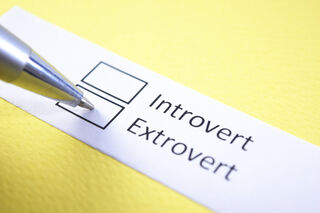Personality
Are Popular Personality Tests Accurate?
Here's what we do and don’t know about Myers-Briggs.
Posted April 1, 2022 Reviewed by Davia Sills
Key points
- Personality tests are often used to help people decide what type of work environment is most suited to them.
- Yet there are serious doubts about whether many of these personality tests are scientifically sound.
- Until we validate these scales in the true technical sense of the term, people should not be relying solely on them to make important decisions.
It’s common in many workplaces these days to encounter some kind of personality or “work style” assessment. Many employers ask employees to take these assessments to get a better sense of optimal work settings and workflows for individual employees. For example, naturally introverted employees might do better doing primarily internally-focused research and desk work while someone who is naturally more extraverted might have an easier time working in sales, marketing, or any kind of external-facing work that involves contact with a variety of partners.
The Myers-Briggs Type Indicator is a personality inventory that categorizes people across four domains: introverted versus extraverted; sensing or intuition; thinking or feeling; judging or perceiving. People’s preferences and personality profiles can thus be summed up along these four domains; for example, an INTJ would be someone whose proclivities line up most with being introverted, intuitive, thinking, and judging. While the Myers-Briggs inventory is by no means the only kind of personality or work style inventory that is used in the corporate world (many new assessments have cropped up over the years), it is a very commonly used instrument when people are trying to figure out their general preferences.

But is Myers-Briggs reliable from a scientific perspective?
The test might be popular and pervasive (many readers will have heard of it, and some have probably taken it more than once), but there is some pretty lively debate about whether it is a reliable and accurate instrument. From a purely anecdotal perspective, it is easy to see where there might be considerable flaws in the test. For one thing, we know people who have taken the test once and then taken it again a few weeks later and scored very differently on certain items.
In addition, it is hard to know how to interpret a score that is on the border between two types. For example, it is possible to score right in the middle between being extraverted and introverted. What exactly does this mean, then? It is not clear how to use this kind of information.
A 2018 article in Scientific American offered a relatively harsh view of Myers-Briggs and other personality tests. Among the problems already noted about the test, experts also argue that the questions are confusingly worded, thus making it difficult to know whether people are interpreting the questions in the ways they were intended. In addition, most personality tests were invented in the first half of the 20th century on the basis of researchers’ subjective feelings about the most important components of personality. The result is a wide variety of tests that are not based on solid academic theory about what comprises the most important aspects of a person’s preferences and personality.
In a more recent article in Psychology Today, Dr. Aqualus Gordon argues that claiming the Myers-Briggs has been “debunked” is going a step too far. He argues that calling it pseudoscience is unfair since rigorous academic studies of its efficacy have not been performed. He also points out that people often expect the assessment to predict things that it is not set up to predict, such as job performance. The assessment has a lot more to do with preferences and job satisfaction than with actual performance. Predicting job performance is undoubtedly outside the purview of the Myers-Briggs, but expectations that the assessment can serve this function might lead to more skepticism of the instrument. Furthermore, it is unclear whether the test even does what is within its purview, such as accurately predicting job satisfaction.
Key takeaways
Until we more rigorously study the Myers-Briggs, we cannot make claims about its efficacy or accuracy. Psychometric scales need to be subjected to rigorous validation tests, which it is clear this test has not. Most other personality tests have not been subjected to this kind of validation either. If we want the scientific community to take these tests seriously and advocate for their use, they do need to be properly validated. In the meantime, it probably does no harm to take some of these tests for fun just to get a better sense of how one scores. But putting great stock in their results and making major career decisions based on them may not be warranted without more thorough engagement with the science of psychometric validation.


